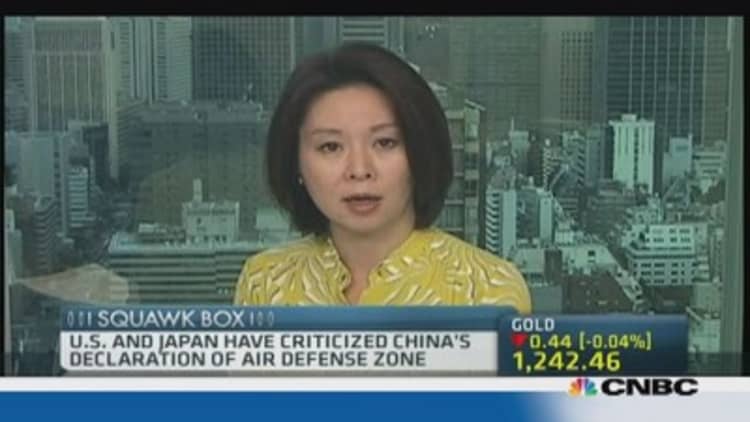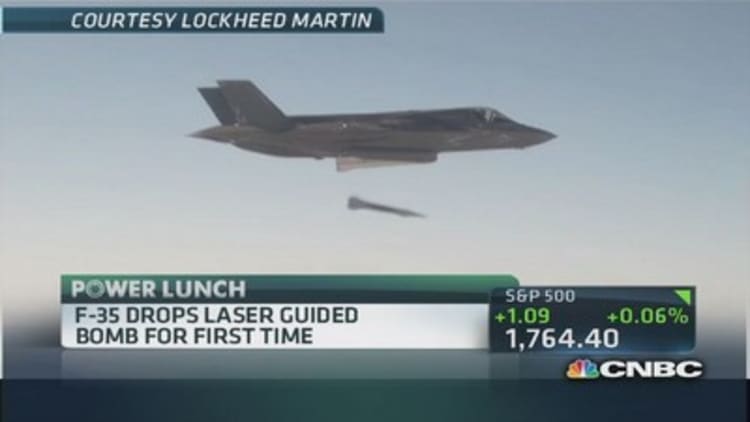Most investors have never heard of Ashton "Ash" Carter. But the man who is the Pentagon's de facto operations chief retires next week, and his departure could have a major impact on the defense industry and Wall Street.
Carter will retire on Dec. 4, after four and a half years at the DoD, first as the Pentagon's chief weapons buyer and then as deputy secretary of defense.
While at the department, Carter made his mark by, among other things, staunchly opposing consolidation among the Pentagon's largest contractors—the so-called "Primes": Boeing, Lockheed Martin, Northrop-Grumman, Raytheon, and General Dynamics.
Some experts have already begun speculating that Carter's departure, coupled with further mandatory spending cuts known as sequestration coming in January, could lead to an uptick in merger and acquisition activity among defense companies.
(Watch: Pentagon hits major milestone)
"I don't think very many people in the Department of Defense care about further concentration in the Defense industry, but Ash Carter put a stake in the ground at a time before defense demand softened," Loren Thompson, a defense analyst at the Lexington Institute, said in an interview.

Until now, DoD budget maneuvers and multi-year procurement contracts have largely shielded major defense companies from sequestration's harshest effects.
Using unallocated funds and other budgeting provisions, the Pentagon absorbed its 2013 sequester cut of $37 billion without canceling any major development programs. However, these stopgap measures only temporarily delayed sequestration's impact and did little to mitigate its effects in future years, when the annual cuts are greater.
"Fiscal 2015's budget is expected to be the catharsis moment," said Robert Spingarn, an aerospace and defense analyst at Credit Suisse. "Assuming that there is no deal to avert the sequester, this is when we expect to see a full sequester impact, which could translate into continued pressure on defense sales across the board, probably through calendar 2017."
(Read more: Behind the Pentagon's doctored ledgers: Epic waste)
Under the Budget Control Act, the DoD faces a whopping $54.7 billion budget cut starting in 2014 and continuing until 2021. As the Pentagon exhausts its budget maneuvers, it will be forced to choose between near-term force strength and long-term development programs. And that could very well mean mergers, experts told CNBC.
"It is inevitable that if federal spending on weapons continues to decline, there will eventually be consolidation in the sector," Thompson said. "I think that there are a number of large-scale combinations that the Pentagon would be increasingly likely to support, because it recognizes that demand will continue softening."
Spinoffs are another option
Any potential defense merger would be subject to a review by the Department of Justice and Federal Trade Commission under the Hart-Scott-Rodino Antitrust Improvements Act of 1976. However, the FTC and DoJ often allow the Pentagon and its leaders to have the final say on defense mergers.
When asked if Carter's departure could result in a change to Pentagon policy, DoD Spokesman Mark Wright said that the Pentagon reviews each merger and acquisition on a case-by-case basis and is comfortable with the current arrangement among its top prime vendors.
(Watch: Lockheed Martin to cut 4,000 jobs)
Brett Lambert, the Pentagon's former head of industrial base policy, said that sequestration also could lead major contractors to spin off non-core, lower margin units.
"If sequester continues, I anticipate you will see at least one of the 'Primes' monetize and sell off portions of the their businesses," Lambert said. "You may see some of the larger companies deconstruct themselves."
Important strategic and budget decisions lie ahead for Carter's replacement, which could affect all levels of the U.S. defense industrial base. President Obama has yet to nominate Carter's replacement, who would be subject to Senate confirmation.
—By John Torrisi, special to CNBC


